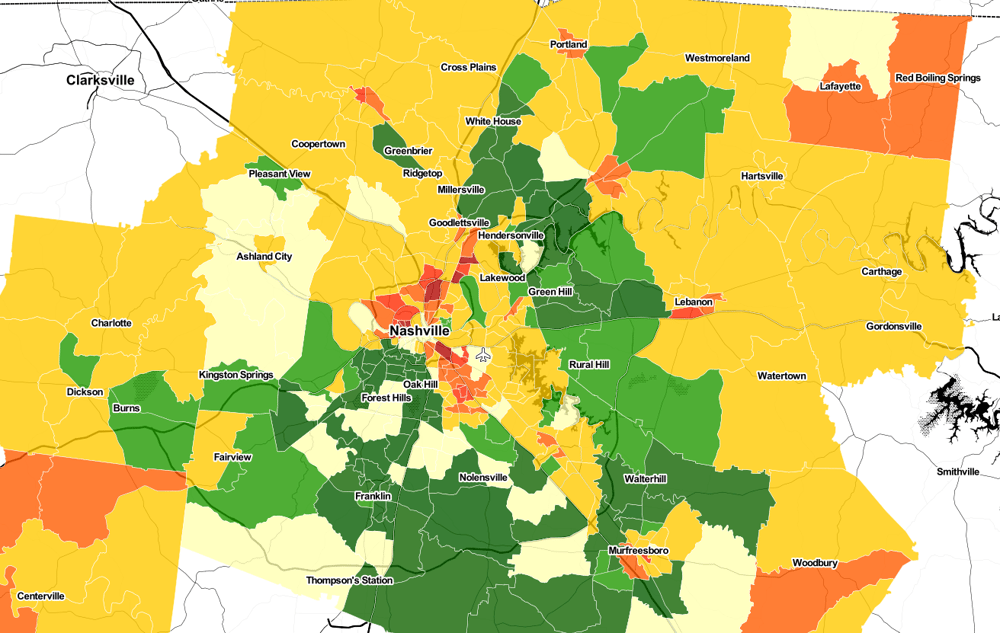The Nashville real estate market continues to heat up, according to a report from the Tennessean. Out-of-state buyers are “flocking” to Nashville, there’s still more demand for housing in Nashville than there is supply, and annual appreciation is hitting record levels.
The robust performance of the Nashville real estate market is one reason why WalletHub ranks Nashville as one of the top 10 places to buy a house. The ranking is based on key investment criteria including activity in the real estate market, growth in property values, and strength of the local economy.
The growing job market and low unemployment rate helped make Nashville one of the top markets for rent growth last year, with a similar growth in rents expected this year as well.
Nashville is the capital of Tennessee and the most populated city in the state. Located in the heart of the Tennessee Valley, the city played key roles in both the Revolutionary War and Civil War, and quickly became a center for transportation and manufacturing.
Nicknamed “Music City,” Nashville today is a major center for the music industry. Manufacturing and transportation still play a key role in the city’s diverse economy, along with the education, healthcare, financial services, and corporate headquarters sectors.
In this article we’ll explore in detail what rental property investors need to know about the Nashville real estate market in 2022.
>>Explore Roofstock's Nashville properties here.
Population growth
Both Nashville and the surrounding suburban counties are growing at a record pace, with the metropolitan area ranked as the 20th fastest growing MSA in the entire U.S. According to the most recent census, the population of Nashville grew by 15% since 2010, while nearby Rutherford, Trousdale, and Williamson counties have seen each of their populations grow by more than 30%.
Key Population Stats:
- City of Nashville is home to over 689,000 residents with nearly 2 million people living in the 10-county Greater Nashville Region.
- Population of Nashville has grown by .09% year-over-year and by 14.7% over the past decade.
- Nashville added more than 343,000 new residents since 2010.
- Nashville is the capital of Tennessee and the most populated city in the state.
- Counties in the Greater Nashville Region include Davidson County (where Nashville is located), and Rutherford, Williamson, and Sumner counties.
- Major cities in the metropolitan area include Nashville, Murfreesboro, and Franklin.
- Also known as the Midstate region, the Nashville metro area is expected to grow by over 500,000 people in the next 20 years.
- Nashville is ranked the number one city for an affordable wedding.
- Median household income in Nashville is $68,406 while per capita income is $36,626.
Job market
As WKRN News recently reported, Nashville is the #1 ranked city for economic growth with more years of robust performance ahead. In fact, there’s very little that can keep Nashville down for long, even a pandemic. Employment opportunities continue to grow, fueled by solid in-migration and business expansions and relocations.
The BLS reports that as of April 2022, unemployment is down to just 2.5%, with job sectors including information, financial activities, professional and business services, and leisure and hospitality recording the highest percentages of growth.
Key Employment Stats:
- The GDP of Nashville-Davidson-Murfreesboro-Franklin MSA is more than $136 billion, according to the Federal Reserve Bank of St. Louis, and has grown by over 61% over the past ten years.
- Employment growth in Nashville is 2.02% year-over-year while median household incomes grew by 6.6% over the same time period.
- Nashville MSA experienced job growth of 26% between 2010 and 2019, making the region the 2nd-fastest growing metro economy in the country.
- Unemployment rate in Nashville is 2.5% as of April 2022, according to the BLS.
- Target industries in Nashville include health care, music and entertainment, advanced manufacturing, corporate operations, and supply chain management.
- Companies with corporate headquarters in Nashville include Bridgestone Americas, Dollar General, HCA Healthcare, and Ryman Hospitality Properties.
- Top employers in the Greater Nashville Region include Vanderbilt University Medical Center, HCA Healthcare, Trane Company, Nissan North America, Middle Tennessee State University, and Amazon.
- Nashville MSA is home to 20 accredited four-year, two-year, tech schools and postgraduate institutions including Vanderbilt University, Tennessee State University, Nashville State Community College, and Belmont University.
- 90.6% of the Nashville residents have a high school degree or higher, while 37.3% hold a bachelor’s degree or advanced degree.
- Interstate highways I-24, I-40, and I-65 converge in Nashville, putting the region within a 2.5 hour drive of 12 million people.
- CSX Transportation provides freight rail service with two major rail yards in Nashville.
- Port of Nashville on the Cumberland River provides access to the Ohio and Mississippi Rivers and the Gulf of Mexico.
- Nashville International Airport (BNA) is one of the fastest growing top 50 airports and the 33rd busiest in the U.S., providing service to nearly 16 million passengers each year.

Real estate market
Nashville is ranked as the #1 real estate market with the best overall prospects in 2022 by PricewaterhouseCoopers. In the most recent Emerging Trends in Real Estate Report, Nashville is classified as a “supernova” city that is on a tear. Even though population growth and the economy are booming, housing prices in Nashville are still relatively affordable and the demand for rental property is high, helping to explain the strong investor appeal.
Key Market Stats:
- Zillow Home Value Index (ZHVI) for Nashville is $446,258 through May 2022.
- Home values in Nashville have increased by 31.0% over the last year.
- Over the past 5 years home values in Nashville have increased by more than 85%.
- Days on market is 25, according to Greater Nashville Realtors.
- Median sales price of a home in Nashville is $498,785 (May 2022).
- Median listing price for a home in Nashville is $448,500 based on the most recent report from Realtor.com (April 2022).
- Median listing price per square foot for a home in Nashville is $271.
- Of the 125 neighborhoods in Nashville, Edgehill is the most expensive with a median listing price of $1 million.
- Most affordable neighborhood in Nashville to buy a home is Nashboro Village where the median listing price is $280,000.
Attractive renters’ market
Nashville is one of the top 10 cities seeing the highest amount of inbound growth as people migrate from more congested urban areas to affordable cities like Nashville.
According to a recent report in the Tennessean, one of the many hot spots in Nashville for rental property is the downtown area right along the Cumberland River. The majority of downtown Nashville homes are rented, with many of the older commercial buildings repurposed into shopping and nightlife venues.
Key Market Stats:
- Median rent in Nashville is $2,075 per month for a 3-bedroom property, according to the most recent research from Zumper (May 2022).
- Rents in Nashville have increased by nearly 25% over the past 3 years.
- 74% of the rental units in Nashville rent for between $1,001 and $2,000 per month, according to RENTCafé.
- Renter-occupied households in Nashville account for 48% of the total occupied housing units in the metropolitan area.
- Neighborhoods in Nashville most affordable for renters include Hadley Park, Village By The Creek, and Valley Grove where rents average $1,195 per month or less.
- Neighborhoods in Nashville with the highest rents include Bellmont-Hillsboro, Urbandale Nations, and Historic Waverly where average rents go as high as $3,825 per month.
Historic price changes & housing affordability
The potential for equity appreciation and rental yield are two financial metrics real estate investors consider before buying rental property.
The historic change in home prices in an area can provide an indication of the possibility of property appreciation over the long term, while the housing affordability index is one indicator of how strong the demand for rental property may be in a given market.
Each month Freddie Mac releases its Home Price Index (FMHPI) report with up-to-date data on the change in home prices for all markets across the U.S. The most recent FMHPI report for the Nashville-Davidson-Murfreesboro-Franklin, TN MSA shows:
- April 2017 HPI: 189.1
- April 2022 HPI: 346.0
- 5-year change in home prices: 82.9%
- One-year change in home prices: 27.8%
- Monthly change in home prices: 1.8%
Housing affordability is another statistic real estate investors review to determine the potential demand for rental property.
The most recent housing affordability index (HAI) report from Kiplinger’s Personal Finance surveyed home prices in the 100 largest metro areas in the country. The survey uses an affordability scale of 1 to 10, with 1 being the more affordable market to buy a home in and 10 being the least affordable.
The affordability index report for Nashville, TN shows:
- Since the last real estate cycle market peak in May 2006, home prices in Nashville have increased by 69.3%.
- Since the last real estate cycle market bottom in March 2012, home prices in Nashville have increased by 94.4%.
- Nashville has an affordability index of 5 out of 10, meaning that Nashville is a much more expensive place to buy a home compared to Memphis where the HAI is 2.
Quality of life
As the official Nashville Visitor and Tourism website says, “If cities had soundtracks, Nashville’s would be like no other.” Live music of all types is performed seven nights a week, and with more than 180 recording studios and 5,000 working musicians Nashville is known around the world as Music City.
Of course, there’s more to Nashville than just music. The metro area is home to pro sports teams, a huge park system, and famous attractions such as the Parthenon and Nashville’s Hot Chicken restaurants.
Key Quality of Life Stats:
- Forbes ranked Nashville as the 14th best place for job growth, 15th best place for business and careers, along with high scores for education and cost of doing business.
- Nashville was ranked by WalletHub as the 71st best city for jobs this year.
- Niche.com gives Nashville high scores for nightlife, housing, and outdoor activities.
- U.S. News also ranks Nashville as one of the best places to live in the U.S. and a great place to retire, giving the Music City high ratings for desirability, value, job market, net migration, and quality of life.
- Climate in Nashville is generally mild with hot humid summers and cool winters.
- Vanderbilt University Medical Center and St. Thomas West Hospital are ranked as two of the best healthcare facilities in Nashville.
- Pro sports teams in Nashville include the NFL Tennessee Titans and NHL Nashville Predators.
Get out the map
Where to begin your search? Roofstock created a heat map of Nashville based on our Neighborhood Rating, a dynamic algorithm that enables you to make informed investment decisions by measuring school district quality, home values, employment rates, income levels and other vital investment criteria.

DARK GREEN: 4-5 star neighborhood
LIGHT GREEN: 3.5-4 star neighborhood
YELLOW: 2.5-3 star neighborhood
ORANGE: 2 star neighborhood
RED: 1 star neighborhood
Ready to invest in the Nashville housing market? If you haven't already done so, create your free Roofstock account and set up alerts. We'll notify you when we have a Nashville investment property that matches your search criteria.









